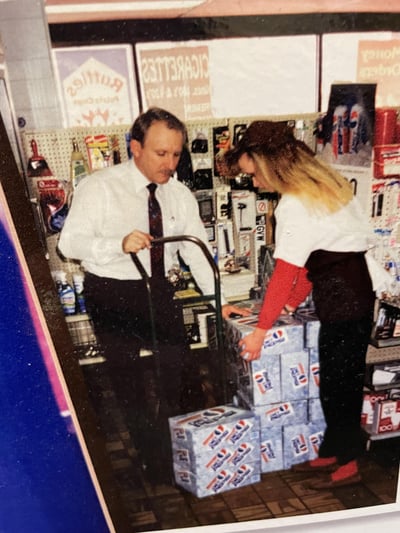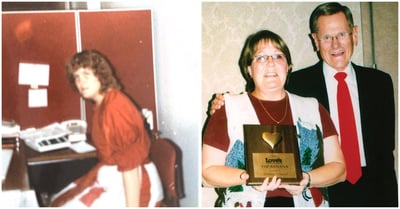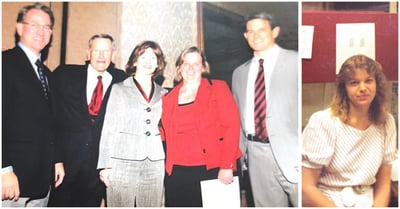60 years of innovation
Longtime team members reflect on journey of innovation In January 1972, a young Harold Wells went to work at the Superette in Watonga, Oklahoma, across the street from Tom Love’s service station. By September, both stores were owned by Tom.
In January 1972, a young Harold Wells went to work at the Superette in Watonga, Oklahoma, across the street from Tom Love’s service station. By September, both stores were owned by Tom.
At the time, Harold was working part-time and going to college, but one could imagine that Love’s, which was expanding into the country store model, saw something in the young grocery store employee.
“Well, that’s questionable,” Harold said with a laugh. The timing was perfect. The expanding country stores combined existing convenience store and grocery store models bringing items closer to people in rural areas with extended hours help other local businesses did not offer. It was then that Tom and his team offered Harold what would become a 51-year career with many different roles and the opportunity to help develop an ever-growing business.
Harold saw this in 1979 when he helped open Love’s Fresh Daily Deli. With this concept, stores were preparing their own sandwiches to sell every day, offering customers more peace of mind than pre-packaged ones from other brands.
“At that time, when you bought a pre-packaged sandwich, God knows how old it was and how many preservatives were in it and all those kinds of things,” Harold said. “Our deli became unique in that our sandwiches were prepared to meet the wants and needs of regular customers in each market.”
The Fresh Daily Deli helped meet the needs of customers on the go, but by the 1980s, that customer group was changing. Rural areas began shrinking as interstate highways were developed. That is when Tom saw the need to develop the travel stop – a larger version of the country store along the interstate – catering to highway travelers and professional drivers alike. Harold says that is when it was time to innovate again as the Fresh Daily Deli wasn’t the best fit for these new models.
“It was a great concept, it worked very well for us and was successful, but when we started really growing more with the travel stops, we found out that we needed name recognition,” he recalled. That’s when Love’s began adding national brands like Subway, Carl’s Jr. and Hardee’s to its stores.
A key part of Love’s innovation over the years has always been a dedication to growing and adjusting to meet customers’ ever-changing needs. Around 1998, DeNease Vinyard, who still works for Love’s, helped start the customer service line.

“I had a two-line cordless phone that I was supposed to take everywhere, even the restroom, so if it rang, I could answer it,” DeNease recalled. That single phone she manned grew over the years to become what is now Love’s Contact Center with around 350 employees.
Most outside the company do not even know that Love’s is much more than just travel stops and country stores. Beyond those four walls – other companies in the Love’s family – like Gemini and Musket – keep it moving.
In 2000, Frank Love, Tom’s son, began hiring industry veterans to build a fuel trading arm of the company under the name “Musket.” The team of fuel traders scour the market to find the lowest prices each day in each market where Love’s has locations. In 2001, Tom had another idea – and this one was particularly “bright.” He had a vision of a fleet of yellow tank trailers traveling the country, independently bringing fuel to Love’s stores from coast to coast.
“I thought, ‘Tom, that would be the ugliest thing I’ve ever seen in my life,’” Brent Bergevin, executive vice president of transportation recalled in a 2023 interview. “And now every one of our trucks is yellow—and we haul one of the most iconic tankers in America. Everybody knows who operates those vehicles. It just shows you how smart he was compared to me. He was an unbelievable visionary.”
Gemini became the primary carrier for the company and has grown to operate more than 1,300 trucks, employing around 1,700 professional drivers. This independence helps keep stores “wet” even when competitors are struggling to get fuel due to natural disasters and other issues. “We may haul it further, but we can still get that fuel to our locations which keeps us up and running and keeps our customers happy that we’re there,” Harold said.
Sometimes innovation can also mean going against the grain. In 2016, Love’s purchased Trillium, the second largest distributor of compressed natural gas. Around that time, the Love’s leadership team also began experimenting with alternative services like electric vehicle charging stations, solar panel installations and hydrogen fueling. Many within the industry, and frankly, some within the company, had their doubts. “I was like come on, we’re a gas station,” recalled Rhona Freeman, who’s worked for Love’s for 40 years. “But now it’s working!”
Love’s dedication to innovation through its family of companies provides a sense of stability that allows it to expand into new ventures like factoring, truck washes, RV hookups, and CDL protection subscriptions to name a few. It’s a slow, but intentional process of innovation, learning how these businesses work and doing it right. “I think we’re going to continue to look for those kinds of innovations out there,” Harold said. “What those are – I don’t know – yet.”
 Related 60th Anniversary News:
Related 60th Anniversary News:
- Jan. 29 - KFOR OKC: Celebrating 60 years at Love's, one company tradition continues
- Jan. 19 – OKC Journal Record: Love's Celebrates 60 years in business, fuels economy in 42 states
- Jan. 11 - The Trucker: Celebrating Love’s: 60 Years of Unmatched Innovation, Sustainable Growth
- Jan. 10 - Watonga Republican: Love’s Marks 60th Anniversary
- Jan. 10 - Trucker's News: Love's Travel Stops celebrates 60th anniversary of being in business
- Jan. 9 - CSP Magazine: Love’s Celebrates 60 Years in Business
- Jan. 8 - CDLLIFE: Truck stop giant Love’s celebrates opening first store 60 years ago
- Jan. 8 - Convenience Store News: Love's Marks 60 Years of Operations
.png?h=50&iar=0&w=194)